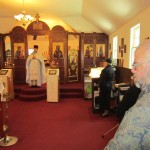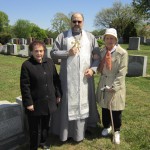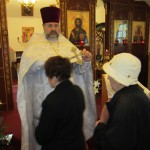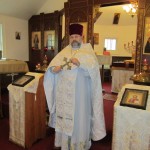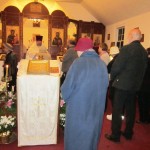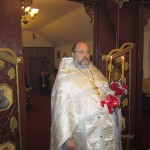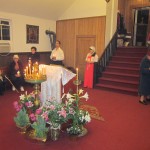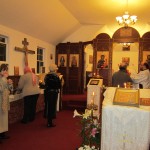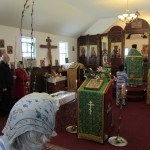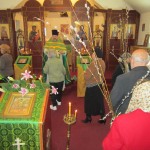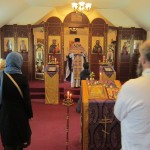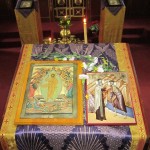On April 29, on Sunday of the Myrrh-Bearing Women, priest Igor Tarasov celebrated the Divine Liturgy at St. George’s Church.
After the Gospel lesson the Rector preached about the Divine Liturgy. Fr. Igor discussed the words of our Lord Jesus Christ pronounced during the Eucharistic Anaphora and taken directly from the Gospels: “Take, eat, this is My Body which is broken for you, for the remission of sins”, and “Drink of it, all of you. This is My Blood of the New Testament which is shed for you and for many, for the remission of sins”. These words are very important because they are the very words of Christ. And due to that Western theologians in the Middle Ages came to a conclusion that these words pronounced over the Gifts at the Liturgy change them over to the true Body and Blood of Christ. However, Eastern Orthodox Church never considered that. We always held that the whole Eucharistic Anaphora is essential for the mysterious change of the Gifts. And our common and strong belief is that the Gifts turn into the Body and Blood of Christ after the serving priest invokes the Holy Spirit upon them.
Fr. Igor also talked about an important part of Eucharistic celebration called the Anamnesis. It is translated from the Greek as ‘remembrance’. After exclaiming the words of Christ the priest in a low voice says that prayer of the Anamnesis. In the Liturgy of St. John Chrysostom the priest says: “Remembering this saving commandment, and all those things which came to pass for us, the Cross, the Tomb, the Resurrection on the third day, the Ascension into heaven, the sitting at the right hand, and the second and glorious coming”. This short prayer is a sign of fulfillment of the commandment of Christ to make the sacrifice of the Liturgy in memory of Him. He left this Sacrament with us and ordered the Apostles to perform it. Thus we fulfill the will of the Savior, do it in memory of Him, as a commemoration of His life, death and Resurrection.
At the end of the Liturgy Fr. Igor preached a very short homily in Russian. He pointed out that in the former Soviet Union many of us who used to live there celebrated the Women’s Day, March 8th. Most of the countries emerged after the collapse of the Soviet state still celebrate that holiday. However, the idea and spirit of that Women’s Day is very strange to Orthodox Christians. Our women’s day is Sunday of the Myrrh-Bearing Women. “Today we honor those holy women who were equal to the Apostles, who were the disciples of Christ. The Lord did not call the women to be the Apostles, but He did call them to the discipleship and a unique ministry. They helped the Apostles and served the Lord Jesus Himself. And they continued to serve Him after He died on the Cross. The Gospel tells us that those women came to the tomb early in the morning to anoint the body of Jesus with fragrant oils. And the Scripture tells us that those women became the first witnesses to the holy Resurrection of Christ. Therefore, the critics of the Orthodox Church who claim that we do not give women enough respect, are very wrong. Women were those to whom our Lord appeared first after His Resurrection. According to the Scripture He appeared to the Myrrh-Bearing Women. And according to the Tradition, He first appeared to His Blessed Mother.”
After the Liturgy Fr. Igor served a panikhida to commemorate the newly-deceased Nicholas Koretz, the brother of our parishioner and parish Treasurer Vera Koretz.
On this day our church services were not limited to our temple. At this point after Pascha we have a proper time for the commemoration of the deceased. Last Tuesday the Church celebrated the Memorial Day called ‘Radonitsa’. Therefore, priest Igor Tarasov visited Flushing and Cypress Hills Cemeteries where he served Litia and blessed the graves of our deceased parishioners, relatives of Vera Koretz and Natalia Soho.

